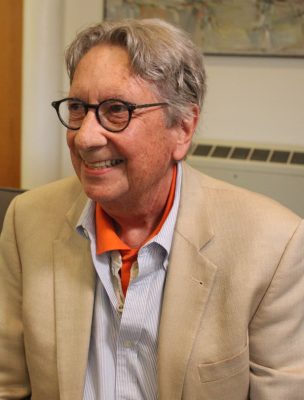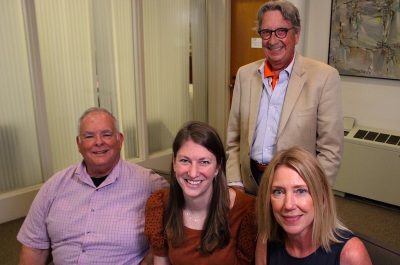As a young person and then a college student, Scott Shablak G’73 says he absorbed two lessons that later served him well as Director of Syracuse University School of Education’s (SOE) Office of Professional Research and Development (OPRD), a position he has held since the early 1980s.
The  first was about helpfulness. “As a kid, I learned that helpfulness runs in my family,” Shablak recalls. “My father was an attorney, but he called himself a ‘counselor at law.’ He was someone who would meet with a divorcing couple and talk them out of it, and he would sometimes accept gifts in kind as payment.”
first was about helpfulness. “As a kid, I learned that helpfulness runs in my family,” Shablak recalls. “My father was an attorney, but he called himself a ‘counselor at law.’ He was someone who would meet with a divorcing couple and talk them out of it, and he would sometimes accept gifts in kind as payment.”
The second was about business smarts. Short for his age growing up—until a growth spurt in his sophomore year at Colgate University—Shablak says he soon found that success on campus could be earned by being helpful, especially to “bigger students who needed some scholastic assistance.”
“That’s when I became service-minded and entrepreneurial,” Shablak continues. “I bought an old vending machine for my fraternity, rented out my room for card games, and sold drinks to earn a little money.”
Make It Useful
Having earned a master’s degree at Harvard University, Shablak taught English to middle school students in Massachusetts. (“I loved teaching middle school. Those kids only had two emotions, very up or very down”) before returning to Central New York to teach in his hometown of New Hartford.
To make his return, New York State required Shablak take a graduate reading course. His choice to join Professor Margaret Early’s class in SOE’s Reading and Language Arts program—picked “because it was on Thursdays”—turned out to be a career and life changer.
After New Hartford, other teaching jobs followed—in the Liverpool Central School District in the Syracuse suburbs and then the downtown Central Technical High School. “That was a wild time for innovation,” Shablak recalls of the late 60s.
Shablak next encountered SOE 10 years later when thinking of embarking on a doctorate. He thought back to Professor Early. At the end of the course she had written on his final paper, “If you’d ever like to consider another degree, see me.” He asked for an appointment. “When I walked in, she looked up and said, ‘Are you ready now?'”
After graduating in 1973, Shablak received a job offer at faraway University of North Carolina (“My wife said, ‘Well, that’s a long commute!'”) Instead, he decided to return to his entrepreneurial roots . “I wanted to take my doctoral research about ‘curiosity arousal’ and effective content area study for students and make it useful, make it part of a school curriculum.”
With the support of his advisor, Professor Harold Herber—whom Shablak recalls saying, “It won’t be easy, but let’s give it a try”—he produced a brochure positioning himself as a “learning facilitator” and shopped it around to Syracuse-area superintendents. Although he received no immediate offers of work, he took the advice of one of those superintendents: help school leaders see how what you do fits a position they are already looking to fill.
Research Into Practice

Eventually, Shablak received a job interview at Westhill Central School District in Syracuse’s western suburbs. It was an odd experience. “I was interviewed by 12 middle- and high school people, and they were very quiet,” he recalls, assuming bad news. “Yet I was hired the next day.” It turns out that 11 of the 12 voted against hiring him, but they were over-ruled by their superintendent.
That experience led to an awkward first few months as Shablak tried to fit in and be useful. “Helpful is only helpful when it’s on another person’s terms. Not me—them,” he muses. Eventually, he offered to tutor one teacher’s struggling students, and she accepted. After seeing successes with one-on-one tutoring, he suggested he enter her classroom and demonstrate the same techniques on a larger scale.
Soon enough other Westhill teachers were asking for his assistance.
So began Shablak’s long history of professional development and grant writing work on behalf of schools and other clients. He suggested to his Westhill colleagues that he write what became the first of many grants to secure funding for a summer workshop on student development: “Over time—and with increasing teacher engagement—Westhill middle and then high school becoming known for what is now termed, ‘inclusivity.’”
“We were the first school around to create a Deaf students program,” Shablak continues. “We worked hard as teams, especially in the middle school, toward real inclusion of students with all sorts of learning differences. Parents with disabled children started to move into the district.”
After about 10 years at Westhill, Shablak interviewed for a position in SOE’s Extension Program. He got the job, he says, partly by explaining how the position could further the School’s mission to convert its research into practice—working directly in some new ways with school districts—and partly because the frontrunner dropped out.
Value and Achievements
Shablak began at SOE in 1982, serving under Associate Dean Sam Yarger and Deena Newman, the first Director of what was then the Office of Professional Development, before he took OPD’s helm in the late 1980s. Along the way he earned a degree in Educational Administration “to help me understand that world of leaders I hoped to work with.”
At OPD, Shablak not only took responsibility for Extended Campus (graduate courses at educational sites throughout Upstate New York and in New York City) and he led development of The Study Council (providing professional development services to area school districts); The Principals’ Center (the first professional development program of its kind in the State); and the Executive Study Institute (a superintendents’ summer program at Minnowbrook Conference Center that focused on liberal arts, taught by SU professors).
Education Exchange—originally edited by Professor Early and which continues to this day as SOE’s alumni magazine—became the responsibility of Shablak’s team, and he began an internal newsletter—In the Halls—”which recognized the value and achievements of non-teaching staff within SOE.”
In the 1990s, OPD expanded its services both on and off campus, supporting grant writing and providing project implementation and evaluation services, including to large scale New York State Education Department initiatives. In 2004, OPD became the Office of Professional Research and Development (OPRD) and moved briefly to the College of Professional Studies—then called University College—before Dean Douglas Biklen (2005-2014) requested it return to SOE.
Such Fine Fun
Over his time in charge, Shablak says he has overseen teams of “super talented, super committed” full- and part-time staff, who provide grant development and program evaluation services for a wide range of clients, both on and off campus.
From a long list of OPRD education, human service, and industry partners, he notes a few current projects he finds particularly interesting. One is a multiyear evaluation of the We Oppose Violence Everywhere Now (WOVEN) Nurturing Inclusive Community Environments (NICE) initiative. “This is a high school social-emotional intervention program involving restorative justice, community circles, and mediation, launched by Advisory Board member Diana Wege ’76 and funded by The Wege Foundation.”
Another is the 10-year evaluation of the Greater Southern Tier Regional STEM Ecosystem. “This is an initiative by 21 school districts in partnership with Corning Inc. focused on increasing the pipeline of students into science, technology, engineering, and mathematics fields.”
OPRD’s full list of clients includes CenterState CEO; Community4All (an evaluation funded by the National Institute on Disability and Rehabilitation Research); Cornell Cooperative Extension; Early Childhood Alliance Onondaga; Genesis Health Project Network; NASA SpaceGrants; New York State Unified Court System Community Dispute Resolution Center; SOE’s Taishoff Center for Inclusive Higher Education; SU’s colleges of Engineering and Arts and Sciences; and the Department of Education’s Steppingstones of Technology Innovation for Children With Disabilities, in collaboration with SOE’s Instructional Design, Development, and Evaluation program, which Shablak serves as a Research Professor.
“The School of Education has given me a life and a career,” concludes Shablak, looking back on his more than four decades of service. “It provided me with a rich education, and it encouraged me to use that education to take chances to serve those within and beyond its walls. The people here from way back through to today also have taught me that other good lesson—take the work seriously, but yourself not so much. It has really been such fine fun.”
